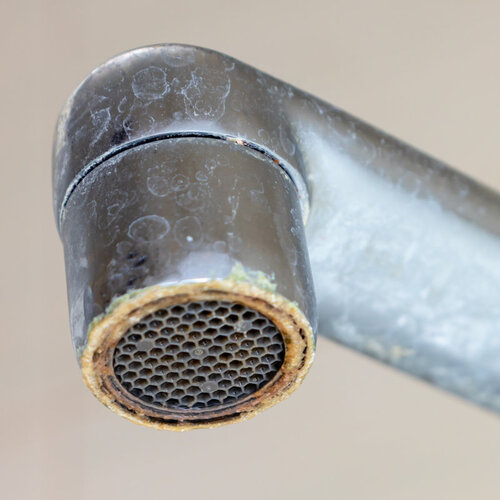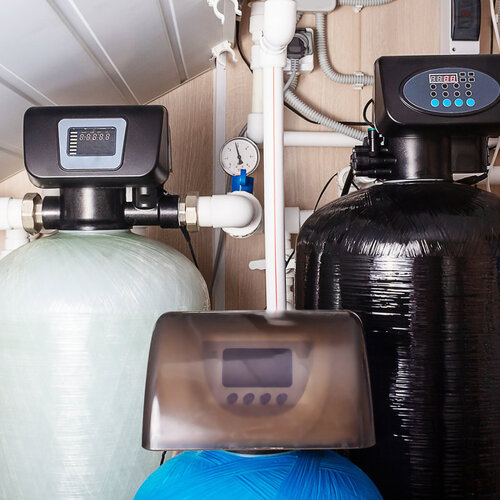
Understanding the Basics
First, let’s answer this question – what is a water softener? A water softener installation is a piece of equipment that removes high concentrations of minerals like calcium and magnesium. When there is a high level of those minerals, the water coming into your home becomes hard. As the incoming water flows through the water softener, those minerals are filtered out, providing you soft water.
Okay, so what exactly is the difference between hard water vs soft water? Isn’t all water liquid? Yes, all water is liquid, but there are two different kinds of water: hard water and soft water. More than 80% of the country has hard water, but why is that a problem that requires having a water softener installation?
As mentioned, hard water has an excessive presence of two harsh but natural minerals: calcium and magnesium. With a high presence of these two minerals, it creates a hard scale in the water, resulting in hard water. While these are minerals necessary for our bodies, too much of a good thing isn’t good.
Soft water on the other hand, doesn’t have these harsh minerals. When there is too much of those minerals, it can be damaging to the plumbing in your home as well as to your body. For example, hard water is more effective with soap whereas hard water inactivates the soap, making it ineffective.
Certain areas of the country are known to have hard water. With a water softener installation into the homes of these areas, the water becomes healthier and more effective. Just looking at the water coming from a faucet won’t tell you if you have hard or soft water. The signs of how to tell you have hard water are:
- A film-like feeling after washing your hands, like the soap didn’t all come off. This is the soap reacting to the calcium minerals in the water. When left on your hands, or any surface, it forms soap scum. To remove that soapy film from your hands, you have to rinse longer, thus using more water.
- Spots on your dishes, especially visible on glasses and silverware when you remove them from the dishwasher. Those spots are from the mineral of calcium carbonate deposits. If those spots are on your dishes, imagine what is inside the pipes and your body.
- Mineral staining on clothes that just came out of the washing machine. Those minerals are stained onto your clothing, and this causes them to become thinner and wear out faster. Again, imagine what those minerals are doing to the insides of your body and the water pipes.
- A low water pressure results from having mineral deposits build up inside the pipes. When your pipes become narrower, the flow of water is reduced.
Is it safe to drink hard water?
Yes, and soft water is safe to drink as well. Where hard water contains a higher level of calcium and magnesium, soft water contains a higher level of sodium. There are health benefits to both hard and soft water, and there are downsides to both as well.
So, if either type of water is safe to drink, what are the benefits of having water softener installation? There are several benefits of soft water:
- Lowers the water bill by not having to rinse longer in the shower to get soap off and dishes don’t need additional rinsing out of the dishwasher.
- Clothing doesn’t wear out as fast
- Soap scum is gone.
- Body and hair are less dried out , healthier.
- Plumbing and water using appliances last longer.
How do you soften hard water?
You can soften water naturally by adding sodium carbonate to the dishwasher and washing machine. To soften the water coming into your bath or shower though, a water softener installation is the best and most effective way to soften your water.
A water softener installation will collect the calcium and magnesium minerals that cause water hardness with tiny resin beads. This process is referred to as an ion exchange with the sodium or potassium minerals in the resin beads.
How much should it cost to have a water softener installed?
A professional water softener installation averages around $1,500 with the range between $1,000 and as much as $3,000. This depends on the type of water softener system being installed and the size of the home.
The cost includes not only the water softener system itself but the experience of a professional that knows how to install a water softener correctly. They will also provide instructions on recommended water softener maintenance to get the most out of the system for a longer lifespan.

Closing Concern – How much does a water softener cost per month?
The monthly expense after a water softener installation will average around $20 a month. This includes the salt refills each month along with the recommended cleaning and maintenance of the water softener system. Overall, it’s a pretty good value for all the advantages it has to offer.
